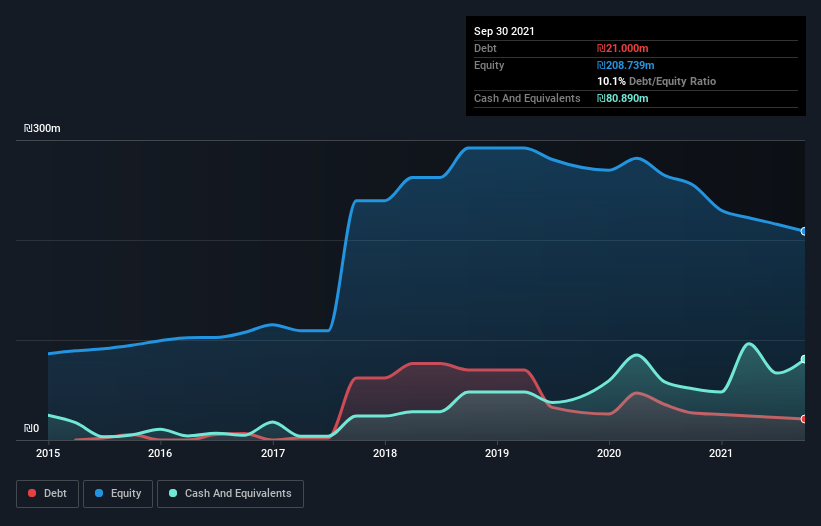- Israel
- /
- Electronic Equipment and Components
- /
- TASE:TLSY
Here's Why Telsys (TLV:TLSY) Can Manage Its Debt Responsibly
The external fund manager backed by Berkshire Hathaway's Charlie Munger, Li Lu, makes no bones about it when he says 'The biggest investment risk is not the volatility of prices, but whether you will suffer a permanent loss of capital.' When we think about how risky a company is, we always like to look at its use of debt, since debt overload can lead to ruin. As with many other companies Telsys Ltd. (TLV:TLSY) makes use of debt. But should shareholders be worried about its use of debt?
Why Does Debt Bring Risk?
Debt and other liabilities become risky for a business when it cannot easily fulfill those obligations, either with free cash flow or by raising capital at an attractive price. Part and parcel of capitalism is the process of 'creative destruction' where failed businesses are mercilessly liquidated by their bankers. However, a more frequent (but still costly) occurrence is where a company must issue shares at bargain-basement prices, permanently diluting shareholders, just to shore up its balance sheet. Of course, plenty of companies use debt to fund growth, without any negative consequences. When we think about a company's use of debt, we first look at cash and debt together.
View our latest analysis for Telsys
What Is Telsys's Debt?
You can click the graphic below for the historical numbers, but it shows that Telsys had ₪21.0m of debt in September 2021, down from ₪27.0m, one year before. But on the other hand it also has ₪80.9m in cash, leading to a ₪59.9m net cash position.

A Look At Telsys' Liabilities
We can see from the most recent balance sheet that Telsys had liabilities of ₪121.4m falling due within a year, and liabilities of ₪31.5m due beyond that. Offsetting these obligations, it had cash of ₪80.9m as well as receivables valued at ₪35.0m due within 12 months. So it has liabilities totalling ₪37.0m more than its cash and near-term receivables, combined.
Of course, Telsys has a market capitalization of ₪973.9m, so these liabilities are probably manageable. But there are sufficient liabilities that we would certainly recommend shareholders continue to monitor the balance sheet, going forward. Despite its noteworthy liabilities, Telsys boasts net cash, so it's fair to say it does not have a heavy debt load!
On the other hand, Telsys's EBIT dived 12%, over the last year. We think hat kind of performance, if repeated frequently, could well lead to difficulties for the stock. There's no doubt that we learn most about debt from the balance sheet. But it is Telsys's earnings that will influence how the balance sheet holds up in the future. So when considering debt, it's definitely worth looking at the earnings trend. Click here for an interactive snapshot.
But our final consideration is also important, because a company cannot pay debt with paper profits; it needs cold hard cash. Telsys may have net cash on the balance sheet, but it is still interesting to look at how well the business converts its earnings before interest and tax (EBIT) to free cash flow, because that will influence both its need for, and its capacity to manage debt. Over the last three years, Telsys actually produced more free cash flow than EBIT. That sort of strong cash generation warms our hearts like a puppy in a bumblebee suit.
Summing up
While it is always sensible to look at a company's total liabilities, it is very reassuring that Telsys has ₪59.9m in net cash. The cherry on top was that in converted 163% of that EBIT to free cash flow, bringing in ₪121m. So we are not troubled with Telsys's debt use. The balance sheet is clearly the area to focus on when you are analysing debt. However, not all investment risk resides within the balance sheet - far from it. We've identified 2 warning signs with Telsys (at least 1 which is a bit unpleasant) , and understanding them should be part of your investment process.
If you're interested in investing in businesses that can grow profits without the burden of debt, then check out this free list of growing businesses that have net cash on the balance sheet.
Valuation is complex, but we're here to simplify it.
Discover if Telsys might be undervalued or overvalued with our detailed analysis, featuring fair value estimates, potential risks, dividends, insider trades, and its financial condition.
Access Free AnalysisHave feedback on this article? Concerned about the content? Get in touch with us directly. Alternatively, email editorial-team (at) simplywallst.com.
This article by Simply Wall St is general in nature. We provide commentary based on historical data and analyst forecasts only using an unbiased methodology and our articles are not intended to be financial advice. It does not constitute a recommendation to buy or sell any stock, and does not take account of your objectives, or your financial situation. We aim to bring you long-term focused analysis driven by fundamental data. Note that our analysis may not factor in the latest price-sensitive company announcements or qualitative material. Simply Wall St has no position in any stocks mentioned.
About TASE:TLSY
Telsys
Telsys Ltd. markets and distributes electronic components and open tools in Israel.
Flawless balance sheet with proven track record and pays a dividend.
Market Insights
Community Narratives



